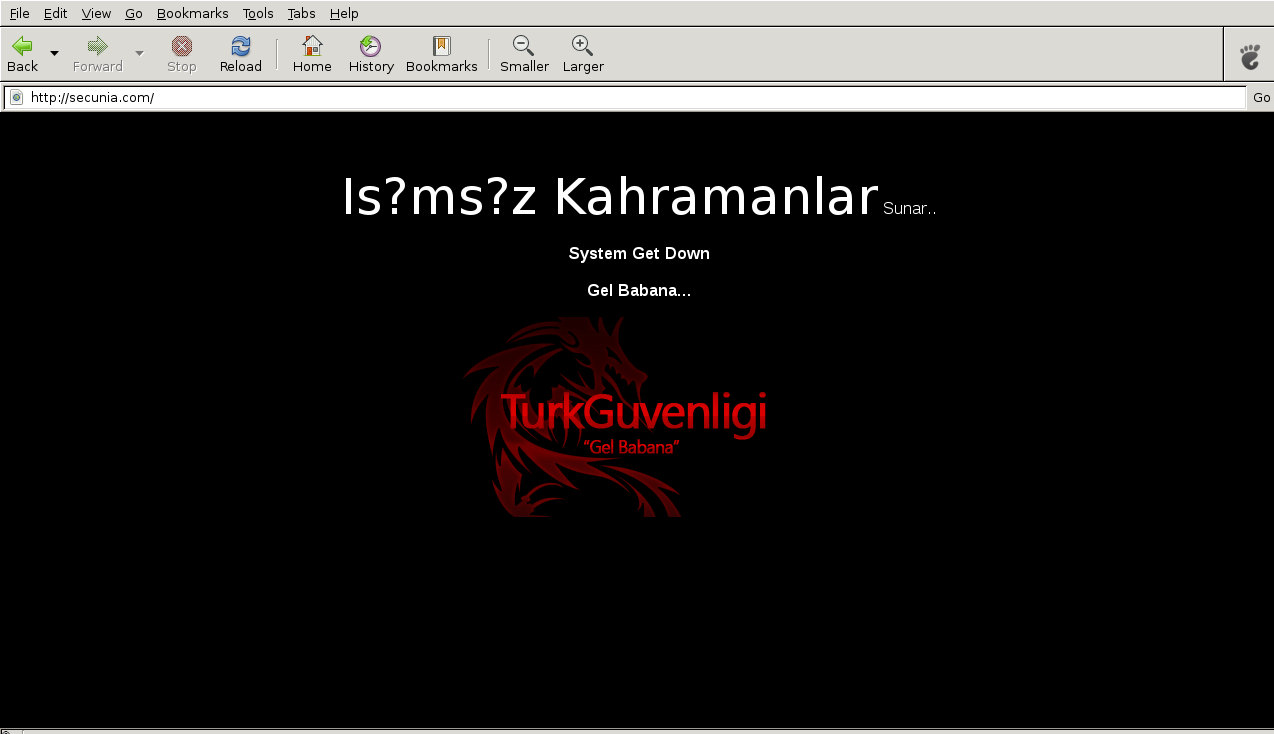
A Turkish hacking group managed to tamper with Internet addressing records over the weekend, redirecting dozens of websites belonging to companies including Microsoft, UPS, and Vodafone to a different web pages controlled by the hackers.
According to Zone-H:
http://www.zone-h.org/archive/notifier=Turkguvenligi.info/page=1 , a website that tracks defacements, 186 websites were redirected to a page controlled by "Turkguvenligi." A message on the redirect page read: "4 Sept. We Turkguvenligi declare this day as World Hackers Day - Have fun

h4ck y0u."
All of the websites were registered through NetNames, which is part of NBT group. NetNames provides DNS (Domain Name System) services for the websites, which is the system used to translates a domain name into an IP address that can be called into a web browser.
Turkguvenligi managed to hack NetName's DNS servers through a SQL injection attack, which involves putting commands into a web-based form to see if the back-end database responds. If those commands aren't scanned for malicious code, an attacker could gain access to the system.
In the case of NetNames, Turkguvenligi put a redelegation order into the company's system and changed the address of the master DNS servers that served data for the websites, according to a statement from NetNames. The attack occurred around 9 p.m. BST on Sunday.
"The rogue name server then served incorrect DNS data to redirect legitimate web traffic intended for customer web sites through to a hacker holding page branded Turkguvenligi," the statement read. "The illegal changes were reversed quickly to bring service back to the customers impacted and the accounts concerned have been disabled to block any further access to the systems."
The hack accomplished by Turkguvenligi is a powerful one. Although it appears the goal of the group was just to vandalize the sites for a while, the group could have set up lookalike sites for the real ones, tricking users into thinking they were on the legitimate site and possibly stealing logins and passwords.
Two of HSBC's banking sites -- one with a country-code Top Level Domain in South Korea and one in Canada -- were targeted, according to the list compiled by Zone-H.
Other websites affected were those belonging to The Telegraph newspaper, The Register technology news site, Coca-Cola, Interpol, Adobe, Dell, several Microsoft country sites, Peugeot, Harvard University and the security companies F-Secure, BitDefender and Secunia. The website for Gary McKinnon, the so-called NASA hacker who is appealing extradition to the U.S. on hacking charges, was also hit.
The Register wrote that its website was not breached and that service was restored about three hours after the attack.
"As far as we can tell there was no attempt to penetrate our systems," wrote Drew Cullen . "But we shut down access/services - in other words, anything that requires a password - as a precaution."
DNSSEC, a security measure now being deployed by many registrars to guard against DNS tampering may not have prevented this kind of attack, said Paul Mutton, a security analyst with Netcraft.
DNSSEC uses public key cryptography to digitally "sign" the DNS records for websites. It is designed to stop attacks such as cache poisoning, where a DNS server is hacked, making it possible for a user to type in the correct website name but be directed to a fake website.
"If the attacker was able to change the DNS settings held by the domain registrar, presumably they could also have changed other settings, such as disabling DNSSEC, or rather, simply change the DNS settings to point to nameservers that do not support DNSSEC."
NetNames described the attacks against its systems as being "sustained and concentrated." "We will continue to review our systems to ensure that we provide our customers a solid, robust and above all secure service," it said.
(PCW)
 Total Members: 14197
Total Members: 14197 Latest: Levine
Latest: Levine Total Posts: 43438
Total Posts: 43438 Total Topics: 16532
Total Topics: 16532 Online today: 3056
Online today: 3056 Online ever: 51419
Online ever: 51419 Total Members: 14197
Total Members: 14197 Latest: Levine
Latest: Levine Total Posts: 43438
Total Posts: 43438 Total Topics: 16532
Total Topics: 16532 Online today: 3056
Online today: 3056 Online ever: 51419
Online ever: 51419